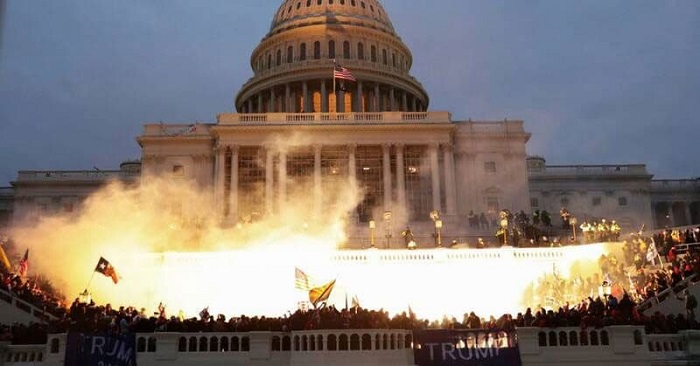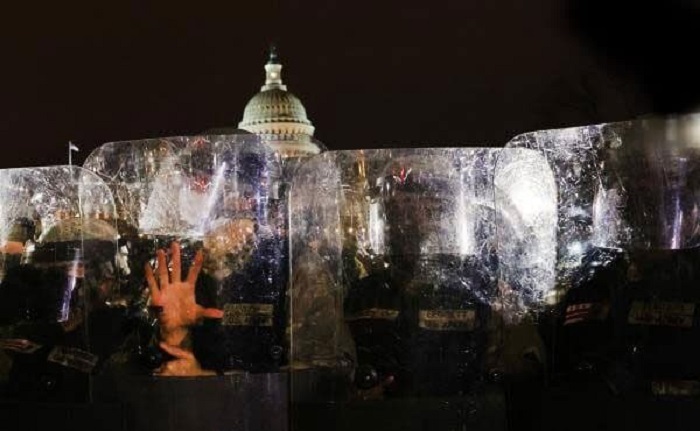An American think tank believes that the failed uprisings in the United States two weeks ago show that the ambitions of the US foreign policy elite are not in line with reality.
Atlantic Council think tank wrote in a note by Emma Ashford: What if journalists wrote about American politics in the same way they did about other countries? Images released of Trump supporters attacking Congress were reminiscent of Boris Yeltsin on a tank, the Arab Spring, or the streets of Venezuela. For those around the world who witnessed this, the United States had become something its leaders had repeatedly condemned: a weak democracy that could not prevent violence and bloodshed during the transfer of power from one leader to another.

Coup aimed at invalidating a democratic election
The American think tank writes that the initial reaction of many commentators is a concern about US moral authority and global leadership, indicating the fragility of the US foreign policy debate. There were also rumors that Chinese President Xi Jinping would be happy with the events and that the riots would undermine the promotion of American democracy abroad. “Trump delivered his latest gift to Putin today, which we hope will be the last,” Michael McFaul, the former US ambassador to Moscow under Obama, wrote on Twitter. Meanwhile, a group of non-governmental organizations, including the National Endowment for Democracy, issued a statement reaffirming its commitment to solidarity with all countries of the world that adhere to democratic values.
According to the author, in the current situation, the United States has bigger problems than the inability to promote democracy around the world or concerns about ambitious global competition with China. The domestic politics of the United States have been influenced by decades of abuse by partisan policies, and while many institutions have resisted so far, there is no guarantee that they will be able to stand up to the next tyrant. Almost the only institution that the American people still trust is the military, which has alarming consequences.
The riots in Congress will certainly affect the global image of the United States, although the past four years have also hurt President Donald Trump. Although the political turmoil that has gripped the country since November has made it harder for the United States to form an international coalition against China, it is unclear why US policymakers gives priority to formed an ambitious coalition against China instead of trying to stop the internal killings.

The incompatibility of America’s ambitious goals with political and economic problems
“Of course, this does not mean calling for the United States to withdraw from the world, because the United States is heavily benefiting from global engagement,” the report said. But Wednesday’s crisis reveals a major problem with US foreign policy: Ambitious foreign policy goals are not at all in line with the country’s political and economic problems.
How can one expect – as Joe Biden promised – that responsible American leadership on the world stage will be restored when it cannot even solve its own internal problems? How can the United States promote democracy in the world or act as a model for others when there is no effective democracy in its country? Washington’s foreign policy elite remains committed to maintaining a three-decade foreign policy aimed at changing the world from the American perspective.
Even projects that have been underway since 2016 with a focus on the common ground between domestic and foreign policy – such as the Carnegie Endowment – have focused primarily on ways to sell the country’s current foreign policy to the American people or consolidate trade and investment policies. The average community will benefit more. Indeed, there needs to be a general overhaul of US foreign policy, a simple, humble approach to the world, and an attempt to address the real problems posed by domestic inefficiency.

The American uprisings and two major foreign policy issues
The Atlantic Council said: “Last week’s US uprisings exacerbated two major problems in US foreign policy. First, it increases the likelihood that other governments will exercise caution in fulfilling their commitments or deep cooperation with the United States. Trump’s four years in office have convinced European and Asian countries that the commitments of the United States may not even have the value of the paper written on them. The Iran nuclear deal, the Pacific trade pact, and the Paris pact all fell victim to the country’s partisan foreign policy. The unrest in Washington and the widespread political unrest following the November election have added to concerns that the upcoming US election may not even be free and fair.
Second, it increases the likelihood that other countries will consider the United States as a risk factor in the international system rather than a stabilizer. There is good reason for this fear: US actions in the Middle East since 2001 have destabilized the region and exacerbated the refugee crisis in Europe. US sanctions policies have created many costs and problems for other countries. The Trump administration’s policy of going to the brink of the abyss over the past few years – with Iran, North Korea and even China – has been more destabilizing than stabilizing. Other countries must take seriously the danger of a country with a very powerful military force, whose domestic policies have become increasingly irregular and undemocratic.
“For months now, the United States has been struggling with the epidemic of Covid 19 because of economic problems and guerrilla politics,” the think tank concluded. However, the riots in Washington were a big shock to the country. A revolt in the heart of the United States government, even if unsuccessful, will have lasting effects.








